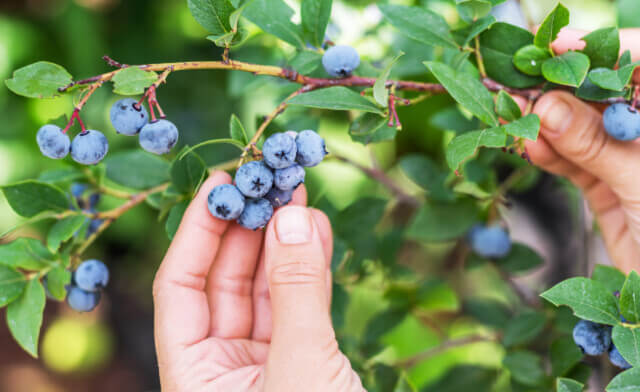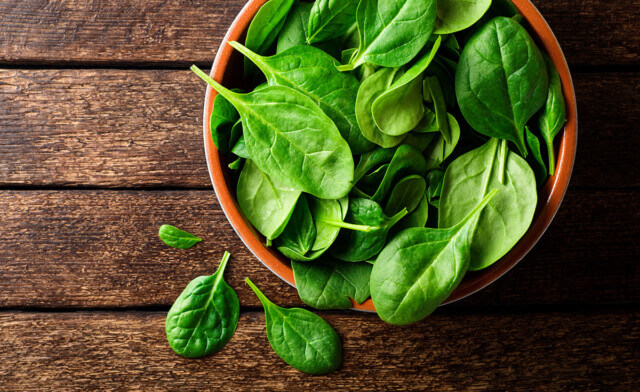Recommended Dog Food for Puppies, Seniors, Small, and Large Dogs
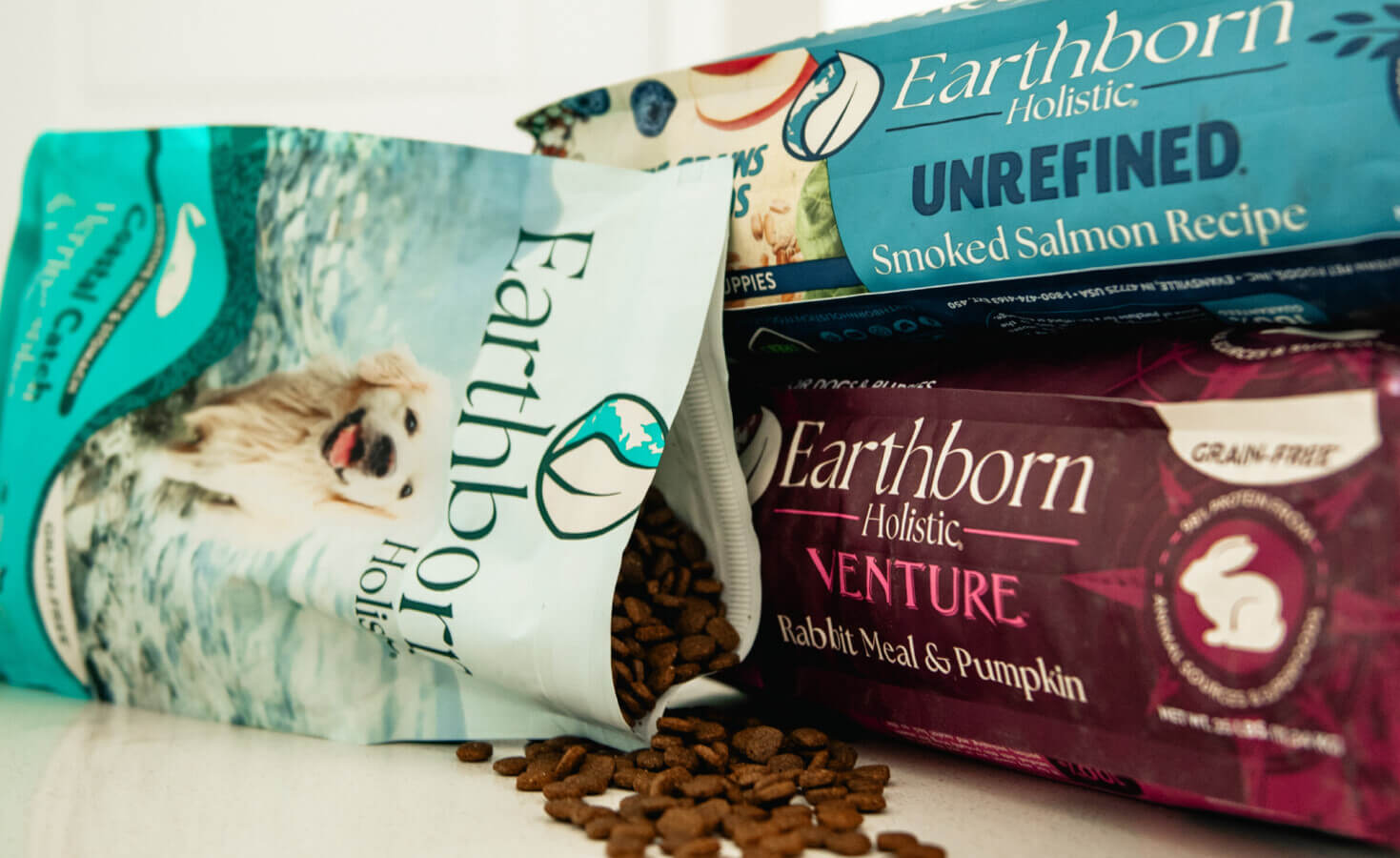
At Earthborn Holistic we have a recipe that’s perfect for every paw. From small seniors to picky puppies and every paw in between, there’s an Earthborn recipe that meets every nutritional need. Learn more about the differences in nutritional needs for different life stages and sizes of dogs so you can find a recommended dog food recipe from Earthborn Holistic that’s perfect for your furry family member.
Differences in Nutritional Needs
Dog nutritional needs vary–from age, to size, to metabolic rates of individual dogs, to even where you live and environmental factors. What your dog needs in a food can be very different from another dog’s needs. If you have a puppy, their needs will be significantly different from that of a senior dog and your giant Great Dane will have a much different diet than your tiny teacup Chihuahua.
Understanding what each type of dog needs in a food is a great start to choosing a food that works best for them, but when it comes down to it, each dog is different! Learning the differences between large breed dog food vs regular dog food might be step one, but always consult with your vet when choosing a food to make sure the food you pick meets all of your dog’s individual nutritional needs beyond their age or size.
How to Feed a Puppy
Puppy nutritional needs are very different from adult dog nutritional needs. Since puppies grow so fast, their nutritional needs include things like higher levels of docosahexaenoic acid (DHA) to help develop the nervous system and cognitive development and more calories and carbohydrates to keep up with their quick growth. Our Unrefined Salmon recipe has all of this and more–easily-digestible whole grains; added Taurine to support your puppy’s heart health; and a nutrient-rich superfood blend of fruits and veggies like pumpkin, blueberries, cranberries, and apples.
A lot of dog foods are also formulated for all life stages, meaning that you can feed it to your dog during their puppy years and beyond unless they need something for more specific nutritional needs. These formulas are great recommended dog food options that decrease the need to switch foods as your dog gets older. They will have two feeding charts listed on the packaging–an adult feeding chart and a puppy feeding chart–so you can be sure you’re feeding your pup the right amount of food for their age and weight.
Our Unrefined line is a great option if an all life stages formula sounds like something you’d want to try for your puppy. These tasty recipes are crafted with fresh proteins like salmon, rabbit, lamb, and turkey and are packed with nutritious superfoods to provide your puppy (or adult!) a tasty meal. For puppies with allergies or sensitivities, our Venture Rabbit Meal & Pumpkin and Alaska Pollock Meal & Pumpkin recipes are great limited-ingredient recipes formulated for all life stages as well.
Another thing to consider is your puppy’s expected size when they’re grown. If you have a large breed puppy, you’ll want to make sure you’re feeding a quality large breed puppy food. Dog food for large breed puppies will be formulated slightly different than regular puppy food–puppies grow quickly, but large breed puppies grow much quicker. They also need added joint support, so the best food for large breed dogs and puppies will include glucosamine and chondroitin sulfate. Our Venture Turkey Meal & Pumpkin recipe, for example, is an all life stages and grain inclusive recipe made with turkey protein, which is a natural source of glucosamine and chondroitin.
As far as when to stop feeding puppy food that is not an all life stages formula, once your pup reaches one year old is when it is generally okay to switch to an adult dog food. Exceptions are made for large and giant breed dogs, which should remain on puppy food until they reach maturity at about two years old. You should always consult your vet before switching foods to make sure you’re feeding a food that meets your dog or puppy’s individual needs.
When you are ready to switch foods, slow and steady wins the race! It’s never good to immediately switch your dog to a new food between meals, especially if it’s a switch in the main protein. This can cause major stomach upset and result in your pup not wanting to eat the new food at all. Instead, do the seven-day switch:
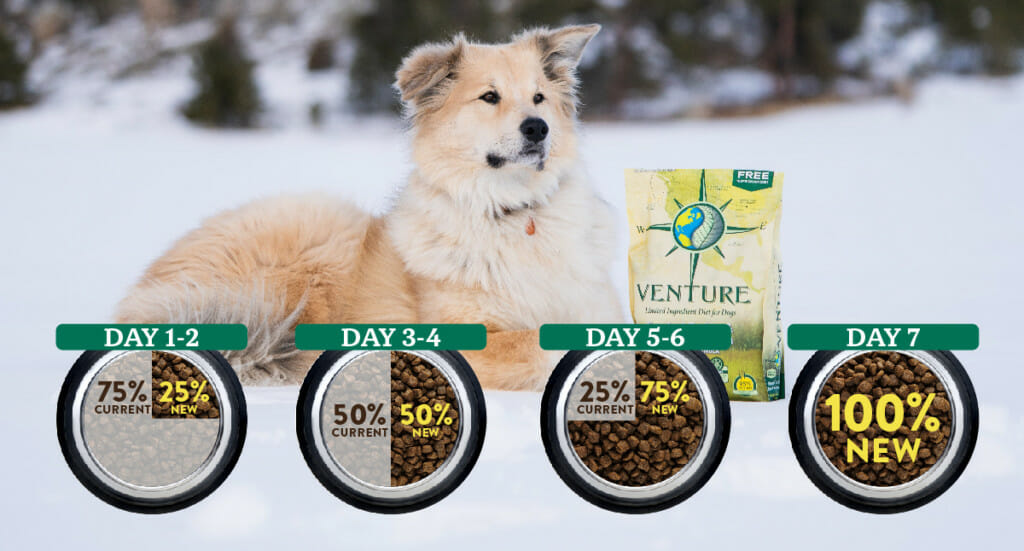
Small Breed Dog Food
When it comes to small breeds, a high calorie dog food is usually best because smaller dogs have a much higher rate of metabolism than large and even medium sized dogs. Because of this and the fact that with a smaller body comes a smaller stomach, recommended dog food for small breed dogs are more calorie-dense so your pup can get all of the nutrients they need in less food. This is why in small breed specific formulas you’ll often find much smaller kibble sizes as well. Small bites dog food makes it easy for your dog’s little mouth to chew up the kibble whereas larger kibbles can be a choking hazard for little dogs.
Our Unrefined Roasted Lamb recipe is a small kibble dog food made with easily-digestible whole grains like barley and chia and a superfood blend of nutrient-rich flaxseed, blueberries, apples, and carrots. This recipe has 355 kcal per cup, making it the perfect recipe to sustain your small dog’s big energy and high metabolism.
If small kibble sizes are what you’re looking for, we have several other small bites dog food options aside from our Unrefined Roasted Lamb formula that could work for your furry friend. If you’re looking for a different protein than lamb, our Venture Rabbit Meal & Pumpkin formula is a tasty recipe that comes in a kibble size similar to that of the Unrefined Roasted Lamb formula. Our Primitive Natural recipe is made with turkey meal, but it’s a grain-free formula that’s high in protein. For little dogs with allergies, our Venture Turkey Meal & Pumpkin recipe comes in small bites with a small list of ingredients to match and our Unrefined Roasted Rabbit kibble is packed with ancient grains and superfoods but free of chicken and potatoes.
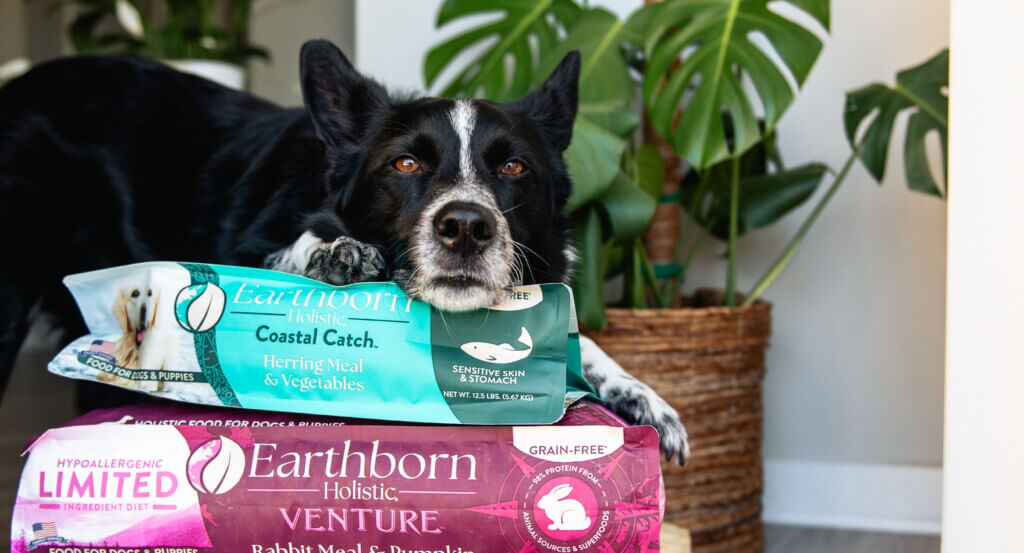
Our moist tub recipes like Chip’s Chicken Casserole Stew are great for small dogs because of the small bites as well, but the best wet dog food for small dogs would be our K95 recipes because of their higher calorie content. Our K95 Beef recipe has just over 31 kcal per ounce compared to about 26 kcal per ounce in Chip’s Chicken Casserole. Whatever you decide to feed, both varieties are packed with nutritious veggies and most wet food recipes are crafted with tasty fruits like apples or blueberries as well.
Large Breed Dog Food
On the opposite end of the spectrum of small breed dogs, large breed dogs have much lower metabolic rates which means most large breed dog food formulas are relatively low-calorie. Our Earthborn Holistic Coastal Catch dog food recipe has 365 kcal per cup which is similar in calories as our Unrefined Roasted Lamb recipe.
Dog joint health is super important when it comes to large breeds. Because large dogs carry so much weight, they’re often prone to joint problems as they grow, so the best dry dog food for large dogs are formulas that are fortified with glucosamine and chondroitin sulfate, two substances that work to support joint health and healthy bones. In addition to glucosamine and chondroitin, most large breed recipes are also fortified with L-Carnitine which helps burn fat, boost metabolism, fight against weight gain, and maintain lean muscle mass in dogs over 50 pounds.
If your dog prefers wet food over kibble, our wet food recipes like K95 Duck are also great recommended dog food options for large breed dogs, but you might find yourself feeding a lot to keep up with your big dog’s big appetite–we recommend one 13 ounce can per 13-15 pounds of body weight daily. If your dog is upwards of 100 pounds, that’s a lot of food!
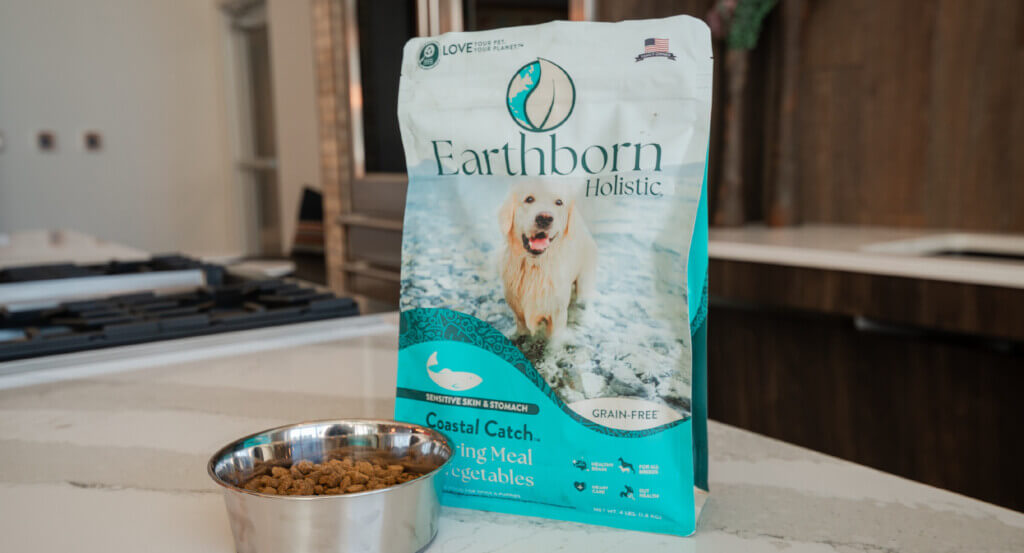
Dr. Anne Huss, Earthborn Holistic’s Director of Nutrition Services, is a large breed dog owner herself and is very involved in her pup’s nutrition:
“Dietary needs of your large/giant breed dog can also change as they age—Cooper, our 9-year-old English Mastiff would agree! In his first two years of life, we had to be sure to feed a diet that allowed his growth rate to be steady to ensure proper skeletal and muscle development. This included adequate protein (minimum 30%), lower calorie density (lower fat), and a balanced ratio of calcium:phosphorus between 1:1 and 1:3, along with added vitamins and minerals like vitamin D, vitamin A, copper, zinc, and manganese for healthy bones.”
It’s important to note that while our Coastal Catch formula is made for all life stages, recipes like Unrefined Smoked Salmon are formulated for all life stages and checks all of Dr. Anne’s boxes for large breed puppies! Made with a minimum of 24% protein, a balanced ratio of calcium:phosphorus, and all of the extra vitamins and minerals needed to support the growth of your large breed puppy, Unrefined Smoked Salmon is another a great option to get your puppy started on the right paw until they’re ready to be switched over to an adult formula. This recipe is also great if if you’re looking for a large breed dog food without chicken or just want to try out a different protein source.
As with any food, meeting the nutritional needs of your large breed dog is super important so make sure to check with your vet that the food you are feeding is right for your dog and checks off all the boxes for your pup’s individual needs.
Dog Food for Senior Dogs
Similar to the puppy stage, the age at which your dog becomes a senior differs by size as well. Large breed dogs are typically considered seniors once they reach six or seven years old, whereas small breeds aren’t usually considered seniors until they’re ten or twelve.
A lot of dogs are just as sharp entering their senior years as they are when they’re a puppy, but, similar to humans, when dogs age they typically become slightly less active and their metabolism slows which means they need fewer calories to keep up with their metabolism. If you continue to feed a high-calorie food into your dog’s senior years you risk the possibility of them gaining more weight than they should. This is why the difference in senior dog food vs regular dog food is the lower amount of calories in the food to accommodate their slower metabolisms.
Dr. Anne and Cooper know a thing or two about nutrition for senior dogs as well. She says, “Once Cooper reached his mature body weight, it was important to keep him at an optimum body condition score to prevent added stress to his joints from excess body weight.”
Because of this, another thing to look for when searching for a senior dog food is glucosamine and chondroitin. While these supplements are important for large breed dogs to support their joints, they become even more important as your dog ages and their joints need a little extra support. Arthritis is very common in senior dogs and makes it hard for them to move around like they used to, so the addition of glucosamine and chondroitin will help alleviate inflammation caused by arthritis, should your pup develop it. If you’re looking for an extra nudge of help for your dog’s aging joints, our EarthBites Chewy with Turkey Protein treats are also fortified with glucosamine and chondroitin and can help provide a little extra joint protection.
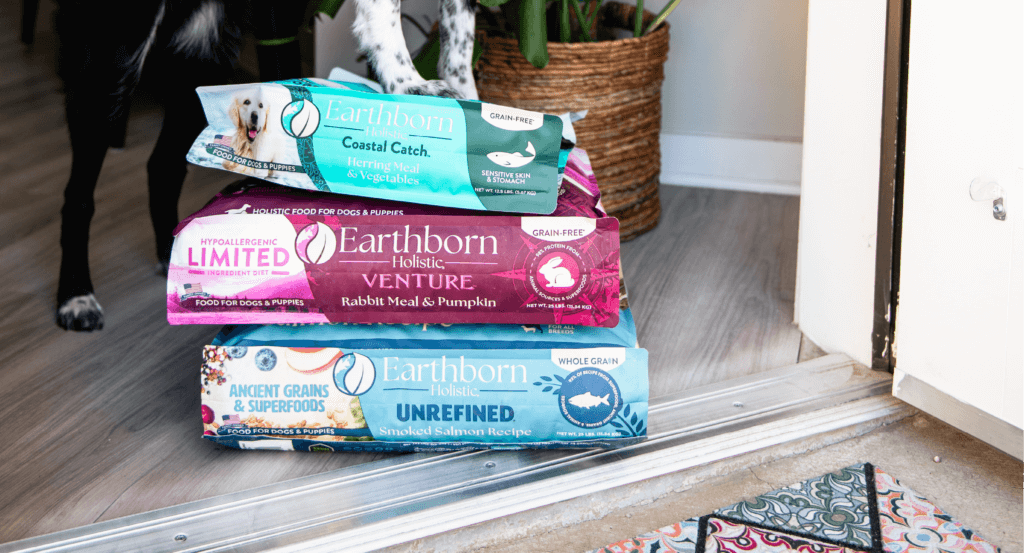
Our Weight Control recipe is our lowest-calorie dry food option and comes in at 315 kcal per cup and is fortified with glucosamine and chondroitin as well. Similar to how low-calorie food is important to large breeds because of the weight on their joints, the same goes for senior dogs. If your senior is overweight, it can put even more stress on their aging joints. Our Venture Alaska Pollock Meal & Pumpkin recipes are also made to support healthy joints as your dog ages and both come in at 345 kcal per cup, making them slightly higher in calorie than the Weight Control recipe, but still relatively low-calorie recommended dog food options for your senior dog.
If you’re looking for the best senior wet dog food, our moist tub dinners like Duke’s Din-Din Stew all have less than 225 kcal per container, with Duke’s Din-Din having only 209. When dogs get older they also sometimes start to have issues chewing harder things like kibble and dog biscuits, so wet food with a softer texture is also a great option in cases like these as well.
What Should I Feed My Pet?
With all this in mind, you might still be a little unsure of what food is best for your dog. This is a common feeling, as no two dogs are exactly the same! They all have unique personalities and preferences in food. What works best for your neighbor’s dog might not work that well for your dog… and that’s okay!
Being knowledgeable about what your pet needs in a food will help you make a more informed decision and choose a healthy recommended dog food meal you can feel confident feeding your pup.
If you think Earthborn Holistic might be the right food for your dog, but want a little extra help in deciding which recipe to try, please send us a message! We’d love to get to know you and your furry family more to help with your decision!


